ISLAMABAD: Pakistan said on Friday it joined the United Nations in calling for a “transparent and credible” investigation into the discovery of mass graves at two major hospitals in Gaza where over 34,000 Palestinians have been killed by Israeli attacks since October.
The discovery of the mass graves, said by Palestinian authorities to contain hundreds of bodies, have triggered calls by the UN rights chief and others for an international investigation. While not defined under international law, a mass grave is a burial site containing multiple bodies, the existence of which could be important in detecting possible war crimes.
Palestinian authorities said a grave site discovered at the Nasser hospital, the main medical facility in central Gaza, contained nearly 400 bodies. It was uncovered after Israeli troops pulled out of the city of Khan Younis.
Another grave site was also found by Palestinian authorities at the Al Shifa hospital in northern Gaza, which had been targeted by an Israeli special forces operation.
“Pakistan joins the call by the United Nations for a clear, transparent and credible investigation of mass graves and the massacre of men, women and children by the Israeli occupation forces,” the foreign office spokesperson said at a weekly briefing in Islamabad.
“An independent and impartial investigation must be held to ascertain the facts, fix responsibility and punish the perpetrators of war crimes and crimes against humanity in Gaza.
“We urge the international community, especially the backers of Israel to take urgent measures to bring an end to the war on the people of Gaza, lift the siege, protect civilians, facilitate humanitarian assistance and to hold to account the perpetrator of Gaza genocide.”
Currently, the International Criminal Court in The Hague has an active investigation into the attacks on Israel on Oct. 7 by Hamas and the response by the Israeli military.
The office of the prosecutor has jurisdiction in the Palestinian territories, but has not made any public comments about the discovery of mass graves.
Under the 1949 Geneva Conventions, to which Israel is a signatory, parties to a conflict must take all possible measures to prevent the dead from “being despoiled.” Customary international humanitarian law (IHL) calls for the dead to be respected, including a duty to prevent despoiling of graves and ensuring the identification and proper burial of human remains.
IHL also prohibits mutilation, desecration and other forms of disrespect toward the dead, while parties should take measures to protect grave sites, including those containing multiple human remains.
In 2002, in a case related to killings of Palestinians in the Jenin refugee camp in the West Bank, Israel’s Supreme Court ruled that the Israeli Defense Ministry was responsible under international law “for the location, identification, evacuation, and burial of the bodies” of Palestinians killed in fighting. The judges said bodies should not be buried in mass graves but handed over to the Palestinian authorities.
The International Criminal Court’s founding Rome Statute defines the desecration or mutilation of dead bodies as a war crime and this is banned as an outrage upon personal dignity.
Allegations by Palestinian authorities that the Israeli Defense Forces (IDF) had buried the bodies were “baseless and unfounded,” the IDF said in a statement. The graves were dug by Palestinians, it said, releasing footage showing the graves pre-dated IDF operations.
IDF forces searching for Israeli hostages had examined bodies buried near Nasser hospital and then returned them, the IDF said.
“The examination was carried out respectfully while maintaining the dignity of the deceased,” it said.
With inputs from Reuters
Pakistan joins call by UN for ‘credible investigation’ into mass graves discovery in Gaza
https://arab.news/rauwh
Pakistan joins call by UN for ‘credible investigation’ into mass graves discovery in Gaza
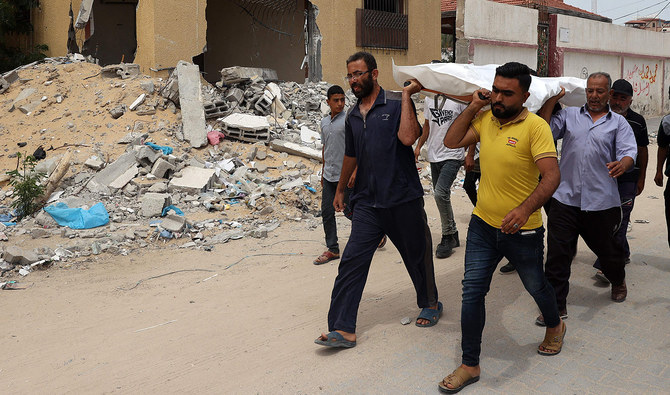
- Palestinian authorities say mass graves at Nasser and Al Shifa hospitals contain hundreds of bodies
- Pakistan says “independent and impartial investigation” must fix responsibility and punish perpetrators
Pakistan’s deaf-staffed beauty salon provides economic opportunity, empowers hearing impaired
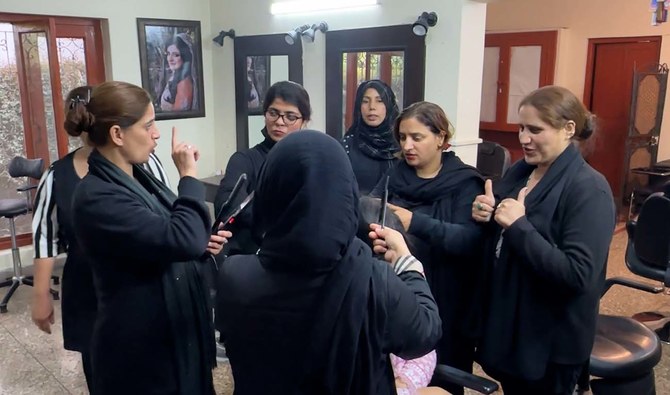
- There are seven deaf beauticians out of a total of 12 employed at Options Salon in Abbottabad
- According to the World Health Organization, deaf population in Pakistan is around 10 million people
ABBOTTABAD: Eight years ago, while offering a training class at her Options beauty salon in the northwestern Pakistani city of Abbottabad, Nighat Aftab received an unlikely application: that from a deaf girl who wanted to attend the training and join her salon.
“I didn’t have much experience working with such women and at first, I hesitated a little that how could I hire such a person whose language I don’t understand?” Aftab told Arab News in an interview earlier this month. “But then I said, ‘Come, join me’.”
Today, there are seven deaf beauticians out of a total of 12 employed at Options, which has since become a sanctuary for women with hearing and speech impairments, providing them economic opportunity, a chance to be financially independent and earn for their families, and a place where they can be part of a supportive, inclusive community.
According to the World Health Organization, the deaf population in Pakistan is around 10 million people. Pakistan has one of the lowest percentages of female labor force participation in South Asia and women with disabilities face even more impediments to employment.
“Previously, I used to work at a parlor in Islamabad where my salary wasn’t great, and I used to miss home a lot,” beautician Saima Mir told Arab News in sign language as Aftab translated for her.
“Now I am very happy. I like working here. There are many here who cannot hear and speak, it makes me happy.”
Others also said they felt a “sense of belonging” at the Options Salon.
“I have my mother and father. They are old. I feel frustrated at home as there is nobody with whom I can talk and share,” Isma Mushtaq told Arab News. “I come here and I spend time here happily.”
While many of the salon’s loyal customers are now used to communicating with the deaf staff members, that was not always the case, Aftab recalled, saying she faced criticism in the beginning by clients struggling to communicate with her workers. To bridge the gap, deaf workers were teamed up with those from the hearing community.
“The difficulties we faced [with communication] in the beginning got resolved over time,” said Sobia Khan, a beautician from the hearing community.
And the troubles had been worth it, Aftab said.
“I might have closed down the salon by now because my daughters are now married and I want to enjoy my own life but I am committed because of these young women [deaf workers] and I am unable to quit because their employment is attached to me,” she said.
“And because of them, Allah has blessed me with health. I am able to come to work daily, even though I am not that healthy, but I am happy here.”
Iran, Pakistan seek ways to complete gas pipeline project
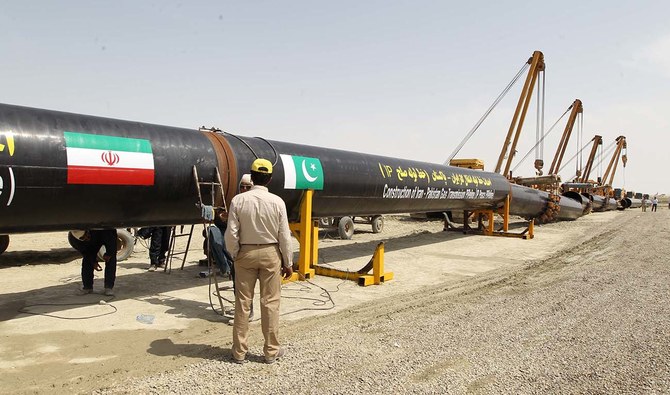
- Both countries signed agreement to construct the pipeline from Iran’s South Fars gas field to Pakistan’s Balochistan, Sindh
- Tehran says has invested $2 bln to construct pipeline, but work on Pakistan side has been held up due to fears of US sanctions
KARACHI: Iran and Pakistan are looking at ways to complete a long-delayed gas pipeline project between the two countries, Iran’s Consul General to Pakistan, Hassan Nourian, said on Monday.
“We see political determination from Pakistan to complete the project,” he told reporters in the southern city of Karachi.
The countries signed an agreement to construct the pipeline from Iran’s South Fars gas field to Pakistan’s Balochistan and Sindh provinces in 2010, but work on Pakistan’s portion has been held up due to fears of US sanctions.
The 1,900 kilometer (1,180 mile) pipeline was meant to supply 750 million to one billion cubic feet per day of natural gas for 25 years to meet Pakistan’s rising energy needs.
Tehran says it has invested $2 billion to construct the pipeline on its territory. Pakistan, however, did not begin construction, citing international sanctions on Iran as the reason.
In 2014, Islamabad asked for a 10-year extension to build the pipeline, which expires in September this year. Iran can take Pakistan to international court, industry watchers have said.
Faced with potential legal action, Pakistan’s caretaker administration this year gave the go ahead in principal to commence plans to build an 80km segment of the pipeline.
In March, Islamabad said it would seek a US sanctions waiver for the pipeline. The US, however, said it did not support the project and cautioned about the risk of sanctions in doing business with Tehran.
Nourian on Monday said the pipeline did not come under international restrictions, and that the two countries were discussing the issue.
He did not answer a question about the potential for Iran to take legal action against Pakistan if it did not complete its side of the pipeline this year.
Pakistan, whose domestic and industrial users rely on natural gas for heating and energy needs, is in dire need for cheap gas with its own reserves dwindling fast and LNG deals making supplies expensive amidst high inflation.
Iran has the world’s second-largest gas reserves after Russia, according to BP’s Statistical Review of World Energy, but sanctions by the West, political turmoil and construction delays have slowed its development as an exporter.
ICC shortlists Pakistan’s Shaheen Afridi, UAE’s Waseem for Player of the Month award
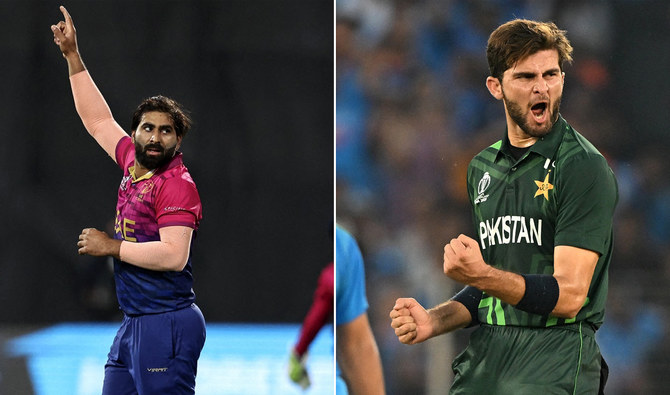
- Shaheen Shah Afridi took eight wickets in last month’s T20I home series against New Zealand
- UAE’s Mohammad Waseem smashed 56-ball century in last month’s ACC Premier Cup final
ISLAMABAD: Pakistan’s pace sensation Shaheen Shah Afridi and UAE batter Muhammad Waseem have been shortlisted for the ICC Player of the Month award for April 2024, the International Cricket Council (ICC) reported on Monday, after the left-arm bowler’s string of impressive performances against New Zealand last month.
Afridi led Pakistan’s pace attack against New Zealand in a home T20I series against the Black Caps in April. Pakistan failed to win the series against a second-string New Zealand squad but drew 2-2 against Michael Bracewell’s squad.
The left-arm pacer, however, played a key role in Pakistan’s victories in two of the five matches played between the teams.
The second T20I saw Afridi blitz through the Blackcaps batting lineup, taking three for 13 as Pakistan registered a dominant victory. Then, trailing in the series for the fifth and final contest, Afridi once again wreaked havoc, taking four for 30 to salvage the series draw. Eight wickets in the series at an average of 10.00 saw Afridi walk away with the Player of the Series prize.
“Shaheen picked up the only wicket in the rain-affected opening match of the series with the Kiwis and then followed that up with two eye-catching efforts in the second and fifth games of the series in Rawalpindi and Lahore,” the ICC said in a report.
“Eight wickets in the series at an average of 10.00 saw Afridi walk away with the Player of the Series prize.”
UAE’s pinch-hitter Waseem is also among the three nominees from the men’s category after scoring bulk runs at the ACC Premier Cup and helping himself to a third T20I century in April. Waseem started the month with a first-ball duck against Kuwait before the 30-year-old quickly found form at the top of the UAE batting order as he helped himself to innings of 65, 45 and 48 in three consecutive matches.
“But Waseem’s highlight of the month came in the final of the ACC Premier Cup as he smashed six fours and a whopping seven sixes in making his third T20I century from just 56 deliveries and helping UAE to an impressive 55-run triumph over Oman,” the ICC said.
Namibia’s Gerhard Erasmus is the third nominee shortlisted by the ICC for his impressive performances during the team’s tour of Oman in April.
Erasmus produced two Player of the Match performances over the course of the five-match T20I series, with his first one coming in a narrow six-run loss in the second game of the series when the versatile all-rounder hit 58 from 56 deliveries and backed that up with a spell that netted 3/7.
However, in the decisive fifth match, Erasmus smashed six sixes when scoring a quickfire 64 from 29 deliveries and then made a pair of crucial breakthroughs as Namibia clinched the series with an emphatic 62-run triumph.
Afridi, who has 81 wickets from 61 T20Is, will be Pakistan’s pace attack leader as the green shirts take on Ireland and England in two away series this month. Pakistan will then head to the US and West Indies where they are scheduled to compete in the ICC T20 World Cup 2024.
Pakistan top court suspends verdict denying reserved parliamentary seats to Khan-backed party

- Under election rules, parties are allotted reserved seats in proportion to number of parliamentary seats they win in polls
- Election Commission ruled in March Khan-backed SIC was not eligible for reserved seats, Peshawar High Court upheld ruling
ISLAMABAD: Pakistan’s top court on Monday suspended a verdict by the Peshawar High Court (PHC) that a party aligned with candidates backed by former premier Imran Khan was not eligible for reserved seats in the legislature, a blow for the country’s coalition government headed by Prime Minister Shehbaz Sharif.
Khan’s Pakistan Tehreek-e-Insaf (PTI) party couldn’t contest the Feb. 8 elections under its traditional electoral symbol, a cricket bat, which it was denied on technical grounds. The PTI subsequently struck an alliance with another party, the Sunni Ittehad Council (SIC), in a bid to secure reserved seats for women and minorities in parliament.
Under Pakistan’s election rules, political parties are allotted reserved seats in proportion to the number of parliamentary seats they win in the election. This completes the National Assembly’s total strength of 336 seats.
The Election Commission had ruled in March that the SIC was not eligible for reserved seats, a decision the alliance had appealed in the PHC, which also rejected it. The SIC then approached the Supreme Court to appeal the high court’s decision.
A three-member bench of the top court took up the SIC’s petition for hearing on Monday.
“The Supreme Court has suspended the Election Commission’s order and the Peshawar High Court’s order,” PTI Chairman Gohar Khan, who is also Khan’s lawyer, told reporters outside the top court after it rejected the PHC verdict. “This is a vindication of our stance.”
He said the Supreme Court had also barred members of other political parties elected on reserved seats that should have been allotted to the SIC from casting their votes for or against any legislation.
The PTI leader said the SIC had been deprived of 67 reserved seats for women and 11 parliamentary seats for minorities. After losing 78 reserved seats, PM Sharif’s coalition government had lost its two-thirds majority, he added.
Khan, who is in jail following a string of convictions, and his PTI say the party was stripped of its bat symbol as a ruse to undermine its popularity and keep it from winning a maximum number of seats in general elections.
In February, an agreement between Bhutto Zardari’s Pakistan Peoples Party (PPP) and the Pakistan Muslim League-Nawaz (PML-N) of three-time Premier Nawaz Sharif ended days of uncertainty and negotiations after the Feb. 8 elections produced a hung national assembly.
The PML-N’s 79 and the PPP’s 54 seats together made a simple majority in parliament to form a government and they also roped in smaller parties in the coalition.
Candidates backed by Khan won 93 seats but did not have the numbers to form a government. He and his party have rejected the results of the elections, alleging widespread rigging.
Pakistan’s benchmark share index rises as much as 1.5%
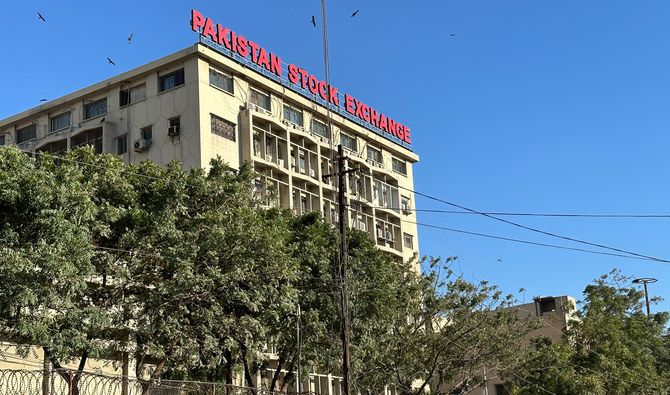
- Pakistan’s benchmark share index has surged 73.4% over the past year, up 12.9% year-to-date
- Market reacting to Saudi business delegation’s arrival, IMF statement on mission visit, says analyst
KARACHI: Pakistan’s benchmark share index rose 1.5% during intraday trade on Monday, to an intraday high of 72,986 points.
The index has surged 73.4% over the past year and is up 12.9% year-to-date.
A Saudi delegation arrived in Pakistan on Sunday for talks on trade and investment opportunities, particularly in the exploration and production sectors.
Adnan Sheikh, assistant vice president at Pak Kuwait Investment Company, said the market was up following news of the delegation’s arrival along with an IMF statement regarding a mission visit.
“The PSX is still very cheap with price to earnings ratio of under 5x compared to average of 8x,” Sheikh added.
Pakistan last month completed a short-term $3 billion program, which helped stave off sovereign default, but the government of Prime Minister Shehbaz Sharif has stressed the need for a new longer term program.
An International Monetary Fund mission is expected to visit Pakistan this month to discuss a program, the lender said on Sunday ahead of Islamabad beginning its annual budget-making process for the next financial year.
The IMF did not specify the dates of the visit, nor the size or duration of the program.
Earlier, in an interview with Reuters, Finance Minister Muhammad Aurangzeb said the country hoped to agree the outlines of a new IMF loan in May.
Pakistan is expected to seek at least $6 billion and request additional financing from the Fund under the Resilience and Sustainability Trust.










